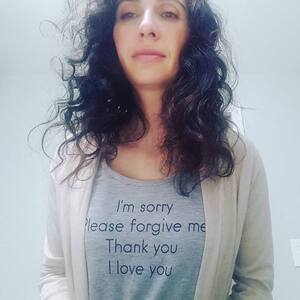 I’m doing my own deep personal work this season around forgiveness. I’ve experienced trauma and loss in the last year and I know that forgiveness is an essential piece of my growth and healing. I’m also consistently seeing resentment as a barrier to wellness with others and observing the incredible miracle of healing through forgiveness. In my work, I’ve been defining forgiveness as the intentional process of letting go of negative emotions regarding an offense or wrongdoing. For me it’s important to clarify that forgiveness is not condoning or forgetting, but a personal process of removing the energy of the negative emotions from your mind, body, and spirit. Forgiveness is a process that involves compassion, personal work, and growth. It includes forgiving others for wrongdoings and often, forgiving ourselves. My curiosity about the interplay of forgiveness, compassion, and unconditional love is heightened right now. Like everything, there is a balance, a yin and yang, or a healthy flow of the forgiveness process. Like all healing, we don’t need to rush forgiveness or deny the emotional experience of our pain. Our healing will not be linear and forgiveness is no exception. Holding on to feelings of anger and hurt lead to a lesser human experience, overshadowing our joy and ability to move forward. If we forgive easily, but do not set boundaries, we allow a certain amount of mis-treatment and ongoing hurt. If we hold on too tightly, we create physical and emotional barriers and symptoms sometimes as severe as cancer or depression (1)
So, right now between Rosh Hashannah and Yom Kippur, I’m digging in. I’m asking myself the tough questions about forgiveness, about balance, about compassion and about moving on. Here’s what I’m learning. 1. Forgiveness is universal: Forgiveness is an essential human process. We’re in relationships, we work with others, we have parents and children and spouses. Relationships and life experiences create infinite opportunities for us to be hurt and to forgive. Through my own personal work and my work with others, I have come to love the diverse, beautiful traditions of forgiveness. No matter where we are, whether we go to a synagogue, a mosque, a temple, or pray to mother earth, as humans we face the universal questions and challenges of forgiveness. We see over and over that forgiveness is a spiritual process, and to access our wholeness and reconnect to G-d, we need to forgive, create space and move forward. In Judaism, as we prepare ourselves for Yom Kippur, we contemplate asking for forgiveness, forgiving others, and forgiving ourselves. We fast, we pray, and we connect to G-d. Other practices have similar wisdom and rituals around forgiveness. “In Buddhism, forgiveness is seen as a practice to prevent harmful thoughts from causing havoc on one's mental well-being.(2) Buddhism recognizes that feelings of hatred and ill-will leave a lasting effect on our mind karma.” In Hinduism,“The theological basis for forgiveness in is that a person who does not forgive carries a baggage of memories of the wrong, of negative feelings, of anger and unresolved emotions that affect their present as well as future.(3) Forgiveness is to be sought from the individual wronged, as well as society at large, by acts of charity, purification, fasting, rituals and meditative introspection.” Lastly, I want to share the practice of Ho’oponopono, which I have found to be a beautiful and simple practice to support any other spiritual practice for daily emotional clearing and especially forgiveness. “Hoʻoponopono is an ancient Hawaiian practice of reconciliation and forgiveness.(4)” At the most basic level, Ho’oponopono gives us the opportunity to say that we are sorry, ask for forgiveness, thank ourselves and others, and send love to ourselves and the situation through the repeated mantra or prayer, “I’m sorry, please forgive me, thank you, I love you.” I’ve shared only a few examples, but I’ve found hundreds of forgiveness practices in my research and they are all essentially the same at their core. Forgiveness is a powerful, necessary, and universal process in our spiritual work! 2. Forgiveness is an act of clearing, shifting energy, and creating space: Forgiveness involves the process of changing or removing the negative emotions associated with a person, an event, or our own actions. Forgiveness is a deeply cleansing process and, as we saw above, is often accompanied by fasting, ritual, purification practices, prayer, and meditation. To forgive is to move energy, to transmute the old lower energy of anger, hurt or resentment, with the cleaner, higher energy of letting go, moving on and creating space. Forgiveness often requires a change of consciousness that can be made more accessible through practices such as chanting, prayer, ritual and fasting. For me, my practice of self-reflection, personal preparation, fasting, and prayer, takes me to a heightened state of consciousness and opening that allows for release and transmutation. 3. Forgiveness has incredible power to heal: The science around the healing power of forgiveness is starting to catch up with what spiritual practices have known for thousands of years. Holding on to anger, hurt, and pain affects on every level. The good news is that forgiving yourself, or others, has the power to heal. At the most basic level, letting go and forgiving allows our bodies to rest and release the stress of holding on to pain, hurt, and negative thoughts. Holding on to negative energy requires the nervous system to stay on high alert and keeps cortisol levels high! John Hopkins Medicine published a wonderful article on “The Healing Power of Forgiveness. Hopkins Psychiatrist, Karen Swartz tell us that “if someone is stuck in an angry state, what they’re essentially doing is being in a state of adrenaline. And some of the negative health consequences of not forgiving or being stuck there are high blood pressure, anxiety, depression, and not having a good immune response. You’re constantly putting your energy somewhere else.” She goes on the share that after forgiveness training she observes, “Blood pressure is lower. People report needing fewer medicines. They report having better sleep. They report physically feeling better and having fewer physical complaints.” We don’t need the science to know that feeling though! We have all experienced that draining, pulling, heavy feeling of holding on to something and not letting go. We know the weight of that choice and how much precious, creative energy it takes from us. 4. How to begin: So, if you are in this place of pain and hurt, this is your moment. Give yourself space to feel and begin the process of letting go. Find an ongoing spiritual practice that supports your higher self and commitment to growth. Simultaneously push yourself to move forward and show yourself gentleness. If you don’t know where else to start, I love these three steps from Aimhappy.com
“There’s potential for a miracle in every conscious attempt at forgiveness.” This is our opportunity. We get to look at ourselves and ask the tough questions. We get to hope for healing and deeper connection. We get to shed the weight of our hurt. If you are not well and you are holding on to something. Please know that forgiveness heals. I’m wishing you all peace, compassion, forgiveness and self-love. G’mar Chatimah Tovah to those who celebrate and incredible blessings to everyone else- Mitten 1. The Wall Street Journal, The Healing Power of Forgiveness https://www.wsj.com/articles/the-healing-power-of-forgiveness-1458525864 2. "Psychjourney – Introduction to Buddhism Series". 2006. Archived from the originalon 2006-04-14. Retrieved 2006-06-19. 3. Michael E. McCullough, Kenneth I. Pargament, Carl E. Thoresen (2001), Forgiveness: Theory, Research, and Practice, The Guildford Press, ISBN 978-1572307117, pp 21-39 4. Translation for Hoʻoponopono given as 'Edit' or 'Correction' translate.google.co.uk, accessed 19 August 2018 5.https://www.hopkinsmedicine.org/news/publications/johns_hopkins_health/summer_2014/the_healing_power_of_forgiveness
2 Comments
7/13/2022 10:38:24 pm
Forgiveness doesn't mean that you stop loving someone who has hurt you; rather it means letting go of those negative emotions so that they don't interfere with your ability to love again. The more you practice forgiving others, the easier it is to forgive yourself when you've made mistakes or done something you regret.
Reply
5/5/2023 01:24:09 am
Forgiving people is easy to do but, Forgetting people especially who hurt you is hard to forget.
Reply
Leave a Reply. |
Mitten's BlogCheck out my blog for day to day useful self and and family nourishment and wellness guidance. Categories
All
Archives
March 2023
|
|
Journey to Wellness © 2018
Based in Boulder, Colorado Helping people heal globally Website designed with love by Kelly McClelland |


 RSS Feed
RSS Feed